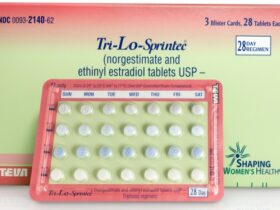Junel Birth Control: Empowering Women’s Choice with Efficacy and Safety
Introduction to Junel Birth Control
A brief overview of birth control methods
Reproductive health advocates have many birth control options.
From condoms and diaphragms to patches and injections, contraception is vast and varied.
People can choose the best method because each has pros and cons.
Birth control pills are a popular type of contraception.
These tiny tablets have revolutionized family planning by providing a convenient and highly effective means of preventing pregnancy. A daily pill with synthetic hormones can regulate menstrual cycles, prevent unwanted pregnancies, and treat acne and PCOS.
Introduction to Junel fe birth control as a popular oral contraceptive
June birth control has established itself as a trusted name in oral contraceptives among the many brands available today. It belongs to a category called combined hormonal contraceptives because it contains both estrogen and progestin hormones. The combination works synergistically to inhibit ovulation, alter cervical mucus consistency, and modify the uterine lining – all key mechanisms that prevent fertilization.
Birth control pills Junel offers users a reliable option for preventing unplanned pregnancies while providing additional benefits, such as lighter periods with reduced cramping. Junel 1/20 birth control comes in different strengths or dosage formulations – each designed for specific needs or preferences.
With birth control junel fe’s popularity growing steadily over the years due to its effectiveness and ease of use, Junel 21 day birth control has become an appealing choice for those seeking hormonal contraception. Individuals can make informed choices about their reproductive health by understanding the basics behind various birth control methods and becoming acquainted with Junel’s role as an oral contraceptive option.
The following sections will delve deeper into the composition, usage, benefits, and potential risks associated with Junel birth control pills. So, buckle up, and let’s embark on this journey of knowledge and empowerment together!
Understanding Junel Birth Control
Composition and Hormonal Components of Junel
Junel oral contraceptives contain ethinyl estradiol and norethindrone.
These hormones inhibit ovarian egg release, preventing fertilization and pregnancy. Norethindrone, a synthetic progesterone, suppresses ovulation, whereas ethinyl estradiol regulates the menstrual cycle.
The specific composition of Junel varies depending on the dosage strength. For example, Junel Fe 1/20 contains 1 milligram (mg) of norethindrone acetate and 0.02 mg of ethinyl estradiol in each active pill.
On the other hand, Junel Fe 1.5/30 has 1.5 mg norethindrone acetate and 0.03 mg ethinyl estradiol in each active tablet. The inactive pills in each pack do not contain any hormones but are included to help maintain consistent daily pill-taking habits.
Mechanism of Action: How Junel Prevents Pregnancy
To understand how Junel prevents pregnancy, it’s important to grasp its mechanism of action within the female reproductive system. The combination of hormones in Junel works through multiple modes: 1. Inhibition of Ovulation: Progestin prevents ovaries from releasing eggs, so sperm cannot fertilize them.
2. Cervical Mucus Thickening: The progestin hormone thickens cervical mucus, making it harder for sperm to reach an egg after ovulation.
3. Endometrial Changes: The estrogen component of Junel helps maintain a stable lining of the uterus, making it less receptive to implantation if fertilization does occur.
Combining these actions, Junel provides an effective barrier against unintended pregnancies when used correctly and consistently. It is worth noting that no contraceptive method is 100% foolproof; therefore, following usage instructions and consulting healthcare professionals is crucial for maximizing the efficacy and reliability of Junel birth control.
Benefits and Efficacy of Junel Birth Control (junel birth control reviews)
Highly effective contraception: Statistics and success rates
When preventing pregnancy, Junel birth control has proven to be highly effective. When utilized properly the failure rate is less than 1%.
This means that out of 100 women who use Junel fe birth control reviews as their primary method of contraception for a year, less than one will become pregnant. These statistics highlight the reliability and effectiveness of this oral contraceptive.
Furthermore, Junel birth control is a combination pill containing estrogen and progestin hormones. These hormones decrease egg release from the ovaries to prevent ovulation.
It thickens cervical mucus, making sperm harder to reach an egg, and thins uterine lining, making it less implantation-friendly.
These multiple mechanisms working together contribute to Junel’s high efficacy in preventing pregnancy.
Additional benefits beyond contraception (e.g., menstrual cycle regulation, reduced acne)
Beyond its primary use as a contraceptive method, Junel birth control offers additional benefits that can greatly improve a woman’s quality of Life. One such benefit is its ability to regulate menstrual cycles. Due to hormonal abnormalities or PCOS, many women have painful or irregular periods.
By taking Junel consistently, women can achieve more predictable and regular periods while reducing heavy bleeding. Another advantage associated with using Junel is its potential impact on acne-prone skin.
Hormonal fluctuations within the body can cause acne. By regulating these hormonal imbalances with the regular use of Junel birth control pills, many women have reported a significant reduction in acne breakouts or even clearer skin.
It’s important to note that while these additional benefits are common among users, individual experiences may vary. Consult a doctor to discover if Junel is the right contraceptive for you and to discuss risks and contraindications.
Choosing the Right Dosage for Junel
Different dosage strengths available for personalized needs
There is no single Junel birth control method.
Other individuals have different needs and considerations when it comes to contraception.
Junel comes in various dosage strengths, allowing women to find the right balance for their bodies. Before prescribing, a doctor should evaluate your medical history, lifestyle, and needs.
The dosage strengths of Junel typically vary based on the concentration of hormones in each pill. For instance, low-dose formulations have lower estrogen and progestin hormone levels.
These may be helpful for women who are more sensitive to hormonal changes or have had ill effects from higher-dose contraceptives. However, people with specific medical issues or irregular menstrual cycles may need higher-dose formulations.
Factors to consider when selecting the appropriate dosage
Several factors need to be considered when choosing the right dosage of Junel. Firstly, it is essential to evaluate any existing health conditions or concerns you may have. Liver disease or blood clotting issues may require reduced birth control pill hormone levels.
Additionally, your age and overall health play a significant role in determining the appropriate dosage. Younger women may benefit from starting with a lower dose as their bodies still adjust hormonally.
Conversely, older women nearing menopause might require a higher dose due to potential hormonal fluctuations. Individual lifestyle factors should also be considered when selecting a dosage strength for Junel birth control pills.
If you frequently travel across different time zones or have an erratic schedule that makes consistent pill-taking challenging, a higher-dose option might offer better protection. Choosing the right dosage of Junel birth control is a decision that should be made in consultation with a healthcare professional.
It involves considering various factors such as medical history, age, health conditions, and lifestyle. By tailoring the dosage to meet your unique needs, you can maximize the effectiveness of Junel while minimizing any potential side effects or risks.
Daily Pill Regimen: When and How to Take the Pills Correctly
Subtitled: “Staying on Track for Contraceptive Success” Taking Junel birth control pills correctly is essential for their effectiveness, so let’s dive into the nitty-gritty of the daily pill regimen. The first step is finding a time that works best for you to take the pill consistently daily.
Whether in the morning while sipping your favorite cup of joe or at night before hitting the hay, choose a time that fits seamlessly into your daily routine. This helps establish a habit and reduces the chances of forgetting.
Now, grab your pack of Junel pills and start with Day 1. Take one medication daily around the same time without any breaks between groups.
Each pack typically contains 28 pills, but remember that only 21 are active pills containing hormones, while the remaining seven are placebo or reminder pills. Taking all 21 active medications as directed by your healthcare provider before moving on to the placebo is essential.
What to Do in Case of Missed Pills or Irregular Usage
Subtitled: “Oops! I Forgot – Don’t Panic!” Life can get hectic, and sometimes we may forget to take our Junel birth control pill on time.
If you miss taking a pill by less than 24 hours from your usual time, fret not! Take it as soon as you remember and resume your regular schedule.
If you miss an active pill by more than 24 hours, there are additional steps.
If you missed one active pill:
1. Take it immediately when remembered, even if it means taking two pills in one day. 2. Continue taking one active pill daily until all active pills are in the pack.
3. Discard any placebo or reminder pills. If you missed two or more active pills:
1. Take the most recently missed pill as soon as possible, even if it means taking two pills in one day. 2. Skip any other missed pills.
3. Continue taking one active pill daily until all active pills are in the pack. 4. Use a backup contraceptive method, like condoms, for seven days.
It’s crucial to consult with your healthcare provider if you frequently miss or forget to take your Junel birth control pills, as they can provide personalized guidance based on your circumstances. For the best oral contraceptive experience, keep to your daily routine and talk to your doctor.
Potential Junel birth control Side Effects and Risks Associated with Junel (pros and cons of junel birth control)
Common Junel fe birth control Side Effects: Nausea, Breast Tenderness, Mood Changes, etc.
It’s crucial to know the negative effects of any drug, including Junel birth control pills.
While most women tolerate Junel well, some may experience common side effects that are generally mild and temporary. The most frequently reported side effects include nausea, breast tenderness or swelling, and mood changes.
Nausea is one of the common side effects associated with Junel. It usually occurs during the first few weeks of starting the medication since your body needs time to adjust to the hormonal changes.
To help alleviate this discomfort, taking Junel with food or before bedtime can make a significant difference for many women. Breast tenderness or swelling may also occur while using Junel birth control pills.
This is due to hormonal fluctuations caused by the medication. Although it can be uncomfortable at times, it’s reassuring to know that this side effect typically subsides after a few months as your body adjusts to the consistent hormone levels provided by Junel.
Another potential side effect of Junel is mood changes. Some women may experience irritability or mood swings while taking this contraceptive method.
These emotional fluctuations are primarily due to hormonal influences on neurotransmitters in the brain. If these mood changes persist or become intense over time, consulting your healthcare provider can help determine if an adjustment in dosage or exploring alternative birth control methods might benefit you.
Rare but Serious Risks: Blood Clots, Stroke, Heart Attack – Understanding the Warning Signs
While rare occurrences, it’s crucial to understand the serious risks associated with any oral contraceptive method like Junel birth control pills. Venous thromboembolism, stroke, and heart attack are dangers.
It’s important to note that the overall risk of developing these complications while using birth control Junel is relatively low, especially in healthy, non-smoking women.
To detect any potential warning signs early on, you must be vigilant about your body and seek medical attention promptly if you experience certain symptoms. Blood clot symptoms include acute leg discomfort, calf or thigh swelling or tenderness, chest pain, shortness of breath, severe headaches, and impaired vision.
These signs may indicate deep vein thrombosis or pulmonary embolism.
In rare cases, hormonal birth control methods like Junel birth control 21 day can increase the risk of stroke or heart attack.
Warning indications include abrupt weakness or numbness on one side, trouble speaking or understanding speech, severe headaches without an obvious cause, chest discomfort radiating to the arm and jaw, and shortness of breath with activity. If you encounter these symptoms suddenly and intensively, get medical treatment immediately.
Remember that while these risks exist with any hormonal contraceptive method like Junel birth control pills, they are rare. Knowing what to look for will help you make informed health decisions when using this drug.
Informed decisions empower individuals towards healthier choices.
Precautions and Considerations with Jun
Understanding Precautions
Precautions should be taken when contemplating birth control.
With Junel birth control, there are a few key factors to remember. First, if you have a history of blood clots or cardiovascular difficulties, see your doctor before starting June.
This is because hormonal contraceptives like Junel may increase the risk of blood clots, especially in individuals who are already predisposed. Additionally, if you smoke or are over 35, discussing the potential risks associated with combined hormonal contraceptives like Junel is essential.
Smoking while using Junel can further heighten the risk of serious complications such as heart attacks or strokes. To choose the best contraceptive, talk to your doctor about your medical history and lifestyle.
Other Considerations
While Junel is generally well-tolerated by most individuals, it is essential to note that certain conditions or medications may interact unfavorably with this birth control method. If you have a history of liver disease or gallbladder issues, inform your doctor, as these conditions may affect how your body metabolizes the hormones in Junel.
Oral contraceptives can be affected by antibiotics and anticonvulsants.
It is crucial to disclose all medications you are currently taking so that your healthcare provider can assess any potential interactions and advise on alternative contraceptive methods if necessary.
Conclusion
While taking precautions when considering junel birth control is vital for a safe and effective experience, it should not deter one from exploring this contraceptive option. By being aware of the potential risks and engaging in open communication with your healthcare provider, you can align the benefits of Junel birth control with your personal health needs. Contraceptive options are highly personal, and what works for one person may not work for another.
So talk to your doctor about birth control options. Your health is important.






Leave a Reply